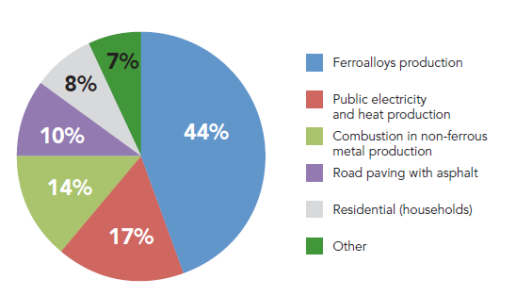Challenges of Climate Change: Air pollution in FYR Macedonia is among the highest in Europe and the particulate matter (PM) in the air is responsible for over 1350 deaths (5th highest in Europe) and thousands of lost workdays annually, representing an economic cost of €253 million annually or 3.2 % of GDP.
Most of the particulate matter pollution is generated by five economic activities in a few largest industrial facilities, as well as the road sector and the household sector. The geographical pattern of the air pollution can also be easily targeted: as over 45% of the health impact occurs in Skopje and a few local production zones.
Opportunities for Green Actions: Reducing air pollution will not only protect human health, but also provide large local co-benefits. Given that over 90% of PM emissions are from metallurgy, electricity and heat production, asphalt mixing in road paving, and household wood burning, actions targeted at these sources should be prioritized.
These actions include using modern equipment in ferroalloys and non-ferrous metal production, installation of pollution abatement equipment and fuel switching in the heat and power production, installation of dust collectors and fabric filters in asphalt mixing plants, and usage of new modern stoves in the household sector.

Actions at the policy level need to extend beyond sulfur oxides, mono-nitrogen oxides, ammonia and volatile organic compounds to include particulate matter. Also, the time it takes to issue environmental permits should be shortened to encourage enterprises to invest in environmental protection for their industrial facilities.
In addition, the government should explore the use of economic instruments to incentivize emission reductions. For example, in cooperation with the financial sector, the government may offer forms of financing that could be made available to firms with well-developed plans for improved environmental management. At a household level, similar incentives could be offered to improve energy efficiency.
In the public health sector, there is a need to undertake more health impact assessments and support greater technical and human capacity on environment/health linkages at the Institute of Public Health. Conducting strategic studies to fill the knowledge gaps in these public health institutions would enable practitioners to analyze the impact of certain economic activities with evidence from FYR Macedonia’s population – and not rely as much on international studies to back up their expert judgment.
The full text of the FYR Macedonia Green Growth Country Assessment can be found here.